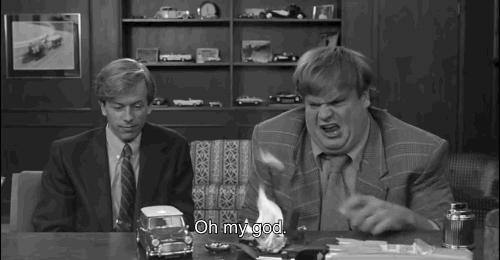Here's the more detailed explanation I promised earlier.
Please understand that I'm not complaining about the movie version. I'm obviously a big fan of the short story. The initial screenplay that TCTTS posted had some significant changes that I was less happy about (q.v. my earlier posts if you're curious), but the final version in the movie was much better than the first one IMO. I did enjoy the movie.
If you'd prefer not to augment your movie experience with the source material, that's absolutely fine. (Lots of GOT fans don't read the books, either.) For those who want to delve deeper, read on. SPOILERS AHEAD FOR BOTH THE MOVIE AND THE SHORT STORY.
I mentioned above that the story explores an interesting, age-old question: if you know your own future, do you still have free will? The story tries to answer this question directly while the movie does so more obliquely. Ted Chiang (the author) sets up the question three ways, none of which translate perfectly to a movie.
First, he writes the story in 1st person and intersperses the plot with Louise's recollections about her daughter's life. These are written with a mixture of past and future verb tenses that make the timing of the events unclear. The movie settles for making these vignettes intrude on Louise's present. This works well enough, although it does imply that Louise is experiencing the future directly while in the present.
Second, Chiang spends a lot of time in the story describing the linguistic discovery process that leads to Louise's understanding of the heptapods' languages -- spoken as well as written. The voiceover exposition in the middle of the movie tries to fill in these gaps. Louise realizes that writing in Heptapod B (the ink circles in the movie) requires the writer to produce the beginning, middle, and end of the "sentence" simultaneously. Human written languages, even ideogrammatic languages like Chinese, are sequentially written and organized. This is because human perception and thinking is oriented towards
linear cause and effect. The heptapods' written language demonstrates that their perception and thinking is oriented towards
purpose (aka teleological.) Did you notice that the heptapods have no "front" or "back"? Their own anatomy -- a barrel like body perched on seven articulated limbs -- is a clue.
Third, Chiang uses Fermat's Principle of Least Time as an analogy to explain what a teleological view of time might look like. In short, a ray of light minimizes the time required to travel between two points, even if the path it takes is actually longer in length that the shortest distance. In other words, the ray of light appears to "know" its own future. The ray of light is "writing" the beginning, middle, and end all at the same time. Like Heptapod B.
With these three elements, Chiang then springs the question: If your life is written in the "Book of Ages" and you read the story of your life, what happens to free will? As Chiang says, in a Greek tragedy the protagonist would do everything possible to avoid fulfilling his/her fate and change the future, but to no avail. Louise knows what will happen -- she will have a child who eventually dies from an accident (cancer in the movie.) Her future is thus already "written". Can she change it?
Chiang's answer is this:
Quote:
For the heptapods, all language was performative. Instead of using language to inform, they used language to actualize. Sure, heptapods already knew what would be said in any conversation; but in order for their knowledge to be true, the conversation would have to take place.
He follows this immediately with a passage in which Louise "remembers" reading the story of Goldilocks and the Three Bears to her (future) daughter. Louise intentionally gets the story wrong to tease her.
Quote:
"That's not how the story goes."
"Well if you already know how the story goes, why do you need me to read it to you?"
"'Cause I wanna hear it!"
Louise explains later that usually her consciousness "crawls along as it did before, a glowing sliver crawling forward in time". But when she cuts over into "thinking" in Heptapod B, she perceives her entire existence, including the portion involving her daughter, simultaneously. She glimpses -- or remembers -- the future. In the movie, this is what happened with her future conversation with the General.
As for the heptapods' purpose in visiting Earth, Chiang provides none. The movie says that the heptapods know that they will need humanity's help 3,000 years in the future. So their visit to Earth, like Louise's phone call to the General, must happen in order for their story to be true. Another neat point: in the movie, the heptapods use their word for "weapon" to refer to their writing system. Louise thinks they really mean "tool", but it works either way. Knowledge of your own future is serious business. A sword that cuts both ways, if you will.
Louise ends the story this way, using the analogy of Fermat's Principle: (I'll spoiler tag this, just in case.)
From the beginning I knew my destination, and I chose my route accordingly. But am I working toward an extreme of joy, or of pain? Will I achieve a minimum, or a maximum?
These questions are in my mind when your father asks me, "Do you want to make a baby?" And I smile and answer, "Yes," and I unwrap his arms from around me, and we hold hands as we walk inside to make love, to make you. 



